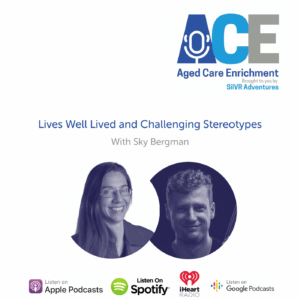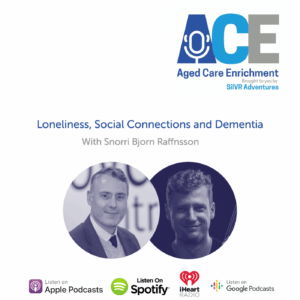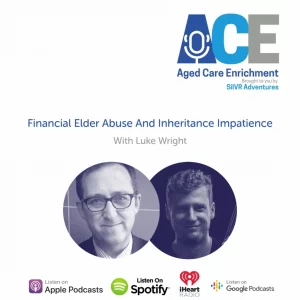Keren Etkin sits at the intersection of technology, entrepreneurship and aged care. With an academic background in Gerontology and experience as a tech founder of the company Sensi.ai, she is well placed to discuss how innovation is shaping the aged care industry.
Through her website thegerontechnologist.com, she spreads the word that aged care is open for innovation, and that tech companies are ready to make a difference where it matters the most.
Her most recent market map highlighted international industry leaders in a wide range of areas, including SilVR Adventures in the category of Senior Living.
In this discussion, Keren shares her journey in marrying aged care and tech. She also heralds some promising technologies that are set to change the focus of aged care.
Transcript
Ash de Neef: Keren. Thank you so much for joining us on the podcast today.
Keren Etkin: Thank you for inviting me.
Ash de Neef: Can we start with a bit about yourself and your background?
Keren Etkin: Yeah, sure. So I am a gerontologist by training and I got a master’s degree in gerontology from Ben Gurion University.
And for the past few years I’ve been working in tech. So once I graduated, I was recruited as the first employee to Intuition robotics, and we built a social robot for all adults, which was a wonderful experience. And during my time at Intuition, I started writing about age-tech because I realised that there were many amazing startups, developing wonderful technology for older adults and they needed attention.
They needed a stage if you will. So I started writing about it. I started mapping the market initially and I published the first market map, and I think it was in 2018. And it took off from there. And after I moved on from Intuition robotics, I started my own company Sensi.Ai which developed software solutions for the long-term care industry, which was a completely different product and also a wonderful and interesting experience.
Ash de Neef: Fantastic. I do want to get to your writing I know through your website, thegeronotechnologist.com and what you’re up to now. But before we do that, can we wind it back to your time at Intuition Robotics and talk about this companion that you were making
Keren Etkin: ElliQ was a social robotic companion for older adults.
So it’s very important to say that it wasn’t meant to replace humans. It was designed to be an enabler of human connection. We know that. Unfortunately in our world, most technology is designed by younger people for younger people. What happens is that we have this digital divide where we have tons of technology and we’re very advanced, we’re the most technologically advanced that humanity has ever been.
But somehow we’re leaving our elders behind because we’re not building technology that is suitable for them. So it’s not only that it’s not always usable, it’s not just about usability. It’s also about desirability. So a lot of the solutions that you and I might want to spend our money on people in their sixties, seventies or eighties might not find them valuable for their lives.
And although they have discretionary income, they don’t always find tech enabled products and services to buy. So ElliQ was, coming back to your question, it was designed as an enabler for social connectivity and for communication.
So right now, especially in Israel, most of them conversation within families happens on WhatsApp. So if your grandma is not able to use WhatsApp, she’s excluded from the family conversation and which is a horrible feeling. So ElliQ was built as an enabler for that. So for example, if I would put ElliQ in my grandma’s living room, I could send ElliQ a text message and she would ask my grandma.
Hey, Keren sent you a message. Do you want to see it? Do you want me to play it out for you? And it would either display or read aloud the message to my grandma and my grandma would be able to reply just by using her voice. And so it’s very intuitive and obviously it’s not just that, you also had a lot of other functions.
So we were able to entertain them with music and podcasts and Ted talks. He was able to provide them with cognitive exercise and trivia games. It was able to offer them hydration, reminders, or medication reminders. All of these different functions that were from the older adult side, they were voice enabled, so they didn’t have to learn anything new.
And from ElliQ’s side, she has these multi modalities so she was able to express herself, not just by using her voice, but also by using gestures like physical gestures or displaying content on the screen or playing sounds or using the LEDs to express herself. So it was also very intuitive to understand what she was trying to say to you.
Ash de Neef: I liked that you started addressing the big issue, which is that there is a lot of tech, but there’s not much which is made with the elder person in mind. And in consultation with your background in gerontology, what was your role in the creation of ElliQ?
Keren Etkin: So I was recruited as the first employee after the founders.
So my role was to do the very basic research, even before we had a product. Just go out into the field, talk to as many older adults as I could and ask them how they’re using technology right now and why they choosing to use certain solutions over others. What makes certain tech work for them and what doesn’t, what would they want?
Out of this product, I told them we’re going to build a device. It’s going to be connected to the internet and it’s going to be voice enabled. You’re going to be able to talk to it and ask for anything you want, what do you want it to do? And out of these responses, we started to build a product.
And of course I did my work here in Israel. And my colleague, Danielle was a who wonderful researcher continued the work in the U S with American older adults. And the responses we received from our beta testers were phenomenal. They really bonded with ElliQ which was amazing to see.
Ash de Neef: Is ElliQ still going or what’s happening with ElliQ now?
Keren Etkin: From what I know, they’re still going strong and I’m super, super proud of them.
Also I think this product is extremely relevant during these times of the COVID pandemic and social isolation. I think ElliQ is such a wonderful product to really help older adults who are sheltering in place.
Ash de Neef: Yeah, fantastic. Now you said you made a market map and that was through your website, thegerontechnologist.com can you tell us a bit about what you’re doing there?
Keren Etkin: So obviously I’m still working on thegerontechnologist.com which is my baby, and what I do at night instead of sleeping. And during the day I currently have some consulting projects that I do with their early stage startups in the age tech space. From time to time, I also get to be an advisor for either startups or investors or other organisations that are in this space of ageing and technology and innovation.
And I also get to do a lot of public speaking, which is such a wonderful thing that I get to be able to do. Before COVID it required a lot of international travel which has its pros and cons. And right now, since geography is no longer a barrier, I get to do a lot more of it.
And I get to be an age-tech evangelist, shouting from the virtual rooftops that this is a huge opportunity and any entrepreneur should be doing age-tech and any investors should be investing in the longevity economy.
Ash de Neef: Yeah. What’s the mission behind the website and the platform?
Keren Etkin: Like I said, my mission is to be an age-tech evangelist and to make anyone who’s willing to listen, understand how big of an opportunity this is from the purely economic perspective and also how important it is for us as a society to really give our attention to older adults.
We’ve never had so many older adults. It’s an unprecedented shift in the global demography of the world. So it’s imperative that we give our elders attention. Not only in going to visit our grandparents, which is like on the micro level of what anyone has to do, but also on the macro level, making sure that everyone gets to age in the way that they want.
So providing ageing in place solutions for people who want to age in place and providing solutions for longterm care providers, for those who prefer to age in a senior living community or have to go into a facility. It’s really important that we, and I say we, because most developers are on the younger side.
It’s crucial that we give our elders attention. It is crucial that we include them in the design process of any product, especially any consumer product. And also it’s critical I think that we think of them. So for example, even if you’re looking at micro mobility solutions or e-scooters.
I’m not sure that the people who are building these thought what the implications are on people who are walking slowly on the sidewalk and are not able to dodge an e-scooter who’s racing towards them.
I think we all need to pay closer attention to our elders. That’s the bottom line.
Ash de Neef: On the website, maybe this is part of your evangelism, but you talked a lot to venture capitalists and investors and people who are involved in supporting this innovation.
Is this just to show that there is a support there, or what’s your direction with that?
Keren Etkin: First of all, I think it’s important to show that there is a support there and what we have today that we didn’t have five to 10 years ago, are venture capitalists who specialise in this space. So first of all, I think it’s important to highlight this as a trend and we see more and more of these funds popping up.
We also see more generalist funds investing in age-tech. A lot of the top tier funds are definitely looking into the space and making investments in this space, which means that they understand there’s potential there. And the other thing is I like to think of myself as an entrepreneur and what I would like to read?
So I’m selfish in that way. So if I were an entrepreneur again, I would want to know who is investing in this space. Who can I reach out to, to fund my startup?
Ash de Neef: Yeah, fantastic. And you’ve also got a podcast right. Associated with thegerontechnologist.com?
Keren Etkin: Yes, I do have a podcast. The first season was about age-tech investors.
So I got to interview several investors in this space and it was extremely interesting and I got a lot of feedback and I’m sure the investors also get a lot of feedback, but right now we’re in hiatus. I might kick start that one again, cause it was it was really fun to do.
Podcasting is fun.
Ash de Neef: It is fun. Yeah, you’re preaching to the choir here. It seems from what I can see over here in Australia, it seems like in Israel, there’s a lot of age tech startups taking off and getting funding. Is that actually happening? What’s going on over there? It seems like it’s very fertile ground.
Keren Etkin: Yeah. The reason we’re called start-up nation is because there are over 6,000 tech companies in Israel and we’re only 9 million people. So in normal days, not pandemic days, if I walk down the street in Tel Aviv and I throw a pebble, I’m going to hit an entrepreneur. It’s insane.
And also it’s fertile ground for innovation and we have tons of investors. We also have tons of really talented people from all walks of life. Who are interested in entrepreneurship.
I think we’re an entrepreneurial society. So it’s very much encouraged to quit your job and become an entrepreneur. We have a really diverse ecosystem with all sorts of solutions from social and communication solutions like ElliQ, to fall detection, technologies, and health and wellness apps and products to virtual reality for rehabilitation. We really have everything.
I think in almost every category of the age-tech market map, there’s an Israeli startup and that’s amazing. I don’t think there are many other countries who can say that.
Ash de Neef: No, you’re probably right there. In Australia we’re seeing a wave of innovation in age tech as well, but we’re also battling maybe a lack of funds or a lack of understanding from aged care providers and the, the clients and the customers and over here. Is that the case in Israel as well, or are aged care providers pretty up with innovation?
Keren Etkin: Aged care providers in Israel are amazing. And like I said, we’re a very entrepreneurial society.
So a lot of the aged care providers are very forward-thinking and very open to innovation. And they’re very open to trying out new products and being beta sites. And they understand if they are working with a startup, they get a product that’s not perfect to say the least. And some of them actually have innovation departments, which is amazing.
It means that you have someone within the organisation who is a, probably a former entrepreneur who speaks the language of tech and entrepreneurship and speaks the language of aged care. And they bring these two worlds together and help these organisation become more innovative and adopt technology.
So I think we’re very fortunate in that aspect.
Ash de Neef: Is there public aged care, is there private aged care in Israel? How does that system break down?
Keren Etkin: So we have a wonderful public aged care system. We were one of the first countries in the world to have a state funded home care. A lot of the older adults in Israel who receive home care, receive at least partial funding from the government.
And which is probably why we have such a large percentage of older adults who choose to age in place. On top of that, we have health care providers within the community and who are able to provide anything from an x-ray to vaccines. So you don’t have to go into a hospital to get proper health care. You can get it in your community, within walking distance from your home, which is amazing.
So we do have a wonderful public support system here. Of course, if you want to pay extra, you can always pay extra like anything in the world. And also, I think one of the major things people have to realise about Israel is that it’s very small geographically. Most people live relatively close to their family members so those are our standards.
Ash de Neef: Yeah. Fantastic. So also in Israel, it seems like there’s quite a lot of support for Holocaust survivors. And when you’re a bit younger, you were working with Holocaust survivors in arranging care for them. What was that experience like?
Keren Etkin: So the reason I got into gerontology is because I volunteered with Holocaust survivors as a student, I was actually studying life sciences.
I wanted to become a scientist and I volunteered with Holocaust survivors as a student and I fell in love with the space. And I realised that the whole ageing space was super interesting. So after upon graduation, I started working with nonprofits with older adults. So it was a really interesting experience as a young person to be exposed to so many older adults who are not your grandparents.
I think it’s an experience that not many young people get to experience. And I think it has in many ways shaped my worldview and the way I not only see the world, but also see myself and see what kind of older adult I want to be . So I’m kinda, you could say that part of what I’m doing is selfish because I want to make a better world for that else because I understand I’m going to be old one day.
The common saying is that if you’re ageist, it’s a crazy thing to be, because you’re discriminating against a group that you’re going to be part of someday. So yeah, I started with Holocaust survivors, which are all old now in Israel and got sucked into the ageing business.
Ash de Neef: When you talk about what life will be like when you’re older and when I’m older, how do you imagine it’ll be different? You’re doing a lot of work in looking at aged care and tech and the future of it.
How do you see it changing over the next, 40 to 50 years?
Keren Etkin: Hopefully we’ll still have a planet to live in.
Ash de Neef: Good start. Yep.
Keren Etkin: Yeah. Yeah. That would be a good start. I really hope we can figure out a way to make everything we do more sustainable. So we actually not only have a plan for ourselves, but also for our grandchildren. But on a more practical way, I obviously, I think we’re going to need a lot of help.
The way the demographic trends are currently working is that we have a lot of older people and we also have a decline in birth rates. So when you and I are old, we’re not necessarily going to have younger people who will be willing to care for us. So it doesn’t matter how much money we’re going to have we might not have a person to help us with very basic things that people need help with as they grow old.
So I think robotics will certainly play a big role in ageing in place. And in helping people do very basic things that don’t necessarily require emotional intelligence, which hopefully will then enable the actual humans to play their role in our lives, as companions as family members. T
To fulfill the basic human needs, right? Because right now, if family caregivers and when they visit their parents or grandparents, they’re busy with cleaning the house, making food, whatever it means that they have less time to pay attention to their older adults emotional needs.
It means that they have less time to maybe sit down and have a conversation with them or play chess with them or learn something from them, or talk about the family history. All of the things that people regret not doing more once their parents or grandparents pass away. So hopefully we’ll be able to delegate all the manual labor to robots and just be humans.
And when it comes to being in the community, obviously like we’re going to have autonomous vehicles. And hopefully also, I really hope public spaces become safer because of that, because right now being an older adult in the city is dangerous. Crossing the street is dangerous, using the sidewalk is dangerous.
So hopefully if we have also delegated driving to machines instead of humans, it will become safer for humans. I really hope that all tech becomes inclusive eventually. I really hope that by the time you and I are in our seventies and eighties, tech is just ambient, so we don’t need to think about it. So that’s my, I want to say prediction, but it’s really a hope that I have for the future.
Ash de Neef: Yeah. It’s your vision, perhaps?
Keren Etkin: Yeah. There are plenty of companies that are that are working on automating some of the simpler tasks in care. I know in Australia, there’s a couple that are doing, autonomous trolleys that can move things around care facilities or automatic medication dispensers.
Ash de Neef: Do you think that it’s possible that with the development of AI to a higher level, we might be able to have robots that can provide emotional care and emotional support. Do you think that’s possible?
Keren Etkin: I don’t know, but a lot of the things that happen today are things that we never thought was possible a few years ago.
Like even things that we take for granted today like text to speech, right? You can send this interview for automatic transcription right after we’re finished and you will have it done within five minutes. And those are things that we never thought were possible. So I don’t want to say anything is impossible because humanity has proved us wrong more than once.
Ash de Neef: Yeah, I think the way that everybody talks about it at the moment is very much like there will always be a role for humans in caring for older people. And I think that’s probably true. But as you said, that ageing population is happening all over the world. And maybe there won’t be enough people to care for people in the same way that we’re doing now.
I wonder if compromises will be made. This is all just future speculation though isn’t it.
Keren Etkin: Absolutely compromises will be made because people who don’t have family members to care for them, who are they going to turn to? They either have to get paid help and if paid help isn’t available, which is already the case in a lot of places in the world, they’ll have to look elsewhere to fulfil these very basic human needs.
And unfortunately not every older adult has a loving family to care for them and fulfil those needs. That’s just a reality.
Ash de Neef: Absolutely. And going back to ElliQ and aspect of what ElliQ was doing was providing companionship and some level of emotional support.
So perhaps it’s not that much of an extension to say what if that went further?
So what does leadership in age tech look like for you?
Keren Etkin: Wow, that is a great question. I think we have many wonderful thought leaders in this space. So just off the top of my head, I can think of Laurie Orlov from Ageing and Health and Tech Watch.
Murray Furlong[??] and Joe Coughlin from the MIT AgeLab, and Tom Kamber from OATS. So leadership has many forms in this space. So some people write like I do. And some people founded organisations, nonprofit organisations, some people are leaders in academia, and some people have conferences. I think leadership in this ecosystem is very diverse.
And we’re very fortunate to have so many talented and driven and smart people driving innovation forward and making sure that everyone has a place in age-tech.
Ash de Neef: If you were called in to help with a company, for example, and they said, Keren, we want you to help transform us into a brand that’s seen as a leading brand and someone who’s really making waves in aged care and technology.
What kind of advice would you give?
Keren Etkin: That is a great question. So first of all, I think Intuition Robotics has done great work with their brand. So not only practicing a user focused design and including older adults in the design process, but also making them at the front. So a lot of the representations we see these days of older adults are ageist.
You will see like a frail older adult who needs assistance. And in the past few years, we’ve seen more and more startups like Intuition Robotics, present older adults in the best of lights. So really showing diverse images of older adults, showing older adults enjoying life rather than at their weakest.
So I think that is like the number one thing, any company in this space needs to do is make sure that their marketing isn’t ageist. Because no one wants to think of themselves as old and frail. I’m not saying that the companies who have made older adults think of themselves as old and frail haven’t succeeded in the past.
But I think that in this day and age, as we see baby boomers ageing, they’re a new generation. I don’t think they’re gonna be okay with these representations. I don’t think they’re gonna want to spend money on products that make them feel bad about themselves, basically. So if we look at the Apple watch, it has fall detection capabilities, and it also has an EKG.
And when you’re over the age of 65, those features are automatically activated. So if you’re over the age of 65, when you have an Apple watch, you have fall detection, but it doesn’t make you feel bad about yourself because the Apple watch is beautifully designed. It’s a cool gadget.
Everyone wants it. It’s expensive. So I think more companies should be going the Apple way and the Intuition Robotics way and not the route that has been very common in the past.
Ash de Neef: I’m going to out myself to listeners here. I’m a bit of a technophobe in some ways. So I have, let me see if I can get my phone for you.
I have a Nokia 3310,
Keren Etkin: no way!
Ash de Neef: Yeah, I know because I’m a little, I don’t like having all the stuff with me, but I’m also, there is a small part of me that is cautious around my data and around my location and that sort of stuff. As we get things like the Apple watch and things that are collecting biometric data in real time.
Do you think that security is another concern that needs to be monitored?
Keren Etkin: To some extent? Yes. I know that governments are really trying to be on top of this and there’s a lot of regulation and also a lot of public awareness. I think at the end of the day, public awareness is key and every one of us as a consumer has to make decisions and we make decisions and we make trade-offs every day.
So every day when we use certain products or services, we trade off personal data for comfort and convenience. I think to some extent we don’t have a choice over it. So even if you don’t, if you’re not using the Apple watch, so the Apple watch won’t collect your location data. You’ll still gonna go outside and you’re gonna have the municipalities cameras recognising your face.
So they’re going to know that you were at the gas station yesterday at 8:00 PM or something like that. So I think to some extent this ship has sailed, but we still need to be conscious consumers. And definitely no one reads the terms and conditions of any service they’re using, but at least the very basic thing that I do is check what permissions applications have on my phone.
Like the very basic thing. So I make sure that I don’t give my data to products or services that don’t provide value to me based on that data. Does that make sense?
Ash de Neef: Absolutely. I guess I feel like for me, there’s a difference between, as you said, the municipalities camera’s catching your face and knowing where you are.
And in the case of some tech that’s being developed, if a private company knows that I’m at risk of developing a heart condition or something, and they have that linked to me – do you think that responsibility lies with governments or lies with industry or lies with individuals in safeguarding the information?
Keren Etkin: I think everyone has responsibility to safeguard information, and everyone has responsibility to not use information in a way that doesn’t provide value to the user basically. Even like some companies might say that using your information, like using your browsing data to give you targeted ads, provides value to you.
Some people might agree with that statement and some people don’t and if you don’t agree, and you know that’s the world we live in, then there are steps you can take to make sure that no one’s tracking your browsing data. Being concerned is one thing and taking action is another thing.
So you need to take action. And most people probably won’t take that action. They can be concerned and they won’t take that action because you walking around with an old Nokia phone is quite radical, right? No seriously. Because most people prefer the convenience of having a smartphone. And you know what, the first time I got a smartphone, I probably had location disabled.
And then I realised that having enabled provided me with convenience and I enabled it. Slippery Slope right?
Ash de Neef: It is definitely, to me, it feels like there is something the slippery slope gets out of control when it’s my biological data. I think when it’s collecting things that relate to my health. I’m sure in Australia, I’m not sure of the specifics, but I’m sure that government agencies and healthcare is collecting information about my health and that’s there to assist in caring for me. I think maybe I’m focusing on this because it’s the idea of private companies having that data as well.
Keren Etkin: I worry about private companies and about public organisations and healthcare providers all the same way.
Ash de Neef: That’s we’ve covered a lot of different stuff there. I’m not sure if the tech ethics questions will make it in, but…
Keren Etkin: No, but it’s an interesting conversation.
Ash de Neef: It is an interesting conversation and it’s one we haven’t had here before. Thank you so much for coming Keren it’s been great.
Keren Etkin: Thank you for having me. It’s been a pleasure.






